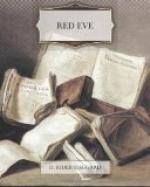“Sire,” answered Hugh, bowing, “I understand, and I will obey to my last breath.”
“Good! When the parchments are engrossed my officer here will read them to you and explain aught that may need it. Meanwhile, we have an hour or two during which your horses can eat, for there are no fresh beasts here to give you, and it is best, to avoid doubts, that you should return as you came, only showing your powers if any should attempt to arrest you. So let us have done with these heavy matters, and disport us for a while. This servant of yours has made a common boast that he will outshoot any of our picked archers, and now we are ready to go forth and put him to the proof of the butts. Let him know, however, that, notwithstanding our words of yesterday, we shall not hold him to blame if he fails, since many a man of higher degree promises more at night than he can perform in the morning.”
“Sire, I’ll do my best. I can no more,” said Grey Dick. “Only I pray that none may be suffered to hang about or pester me at the butts, since I am a lonely man who love not company when I use my art.”
“That shall be so,” said the King. “And now to the sport.”
“The sport!” grumbled Grey Dick, when he and Hugh were alone together. “Why, it is other sport we should be seeking, with Acour and his knaves for targets. Go to the King, master, and show him that while we linger here the Frenchman may slip away, or work more and worse treasons.”
“I cannot, Dick; the parchments are not written out, and his Grace is bent upon this pleasure match. Moreover, man, all these archers here—yes, and their betters also—would say that you had fled because you were an empty boaster who dared not face the trial.”
“They’d say that, would they?” snarled Grey Dick. “Yes, they’d say that, which would be bitter hearing for you and me. Well, they shall not say it. Yet I tell you, master,” he added in a burst of words, “although I know not why, I’d rather bear their scorn and be away on the road to Dunwich.”
“It may not be, Dick,” replied Hugh, shaking his head doubtfully. “See, here they come to fetch us.”
In a glade of the forest of Windsor situated near to the castle and measuring some twenty-five score yards of open level ground, stood Grey Dick, a strange, uncouth figure, at whom the archers of the guard laughed, nudging each other. In his bony hand, however, he held that at which they did not laugh, namely, the great black bow, six feet six inches long, which he said had come to him “from the sea,” and was fashioned, not of yew, but of some heavy, close-grained wood, grown perhaps in Southern or even in far Eastern lands. Still, one of them, who had tried to draw this bow to his ear and could not, said aloud that “the Suffolk man would do naught with that clumsy pole.” Whereat, Grey Dick, who heard him, grinning, showing his white teeth like an angry dog.
Near by, on horseback and on foot, were the King, the young Prince Edward, and many knights and ladies; while on the other side stood scores of soldiers and other folk from the castle, who came to see this ugly fellow well beaten at his own game.




